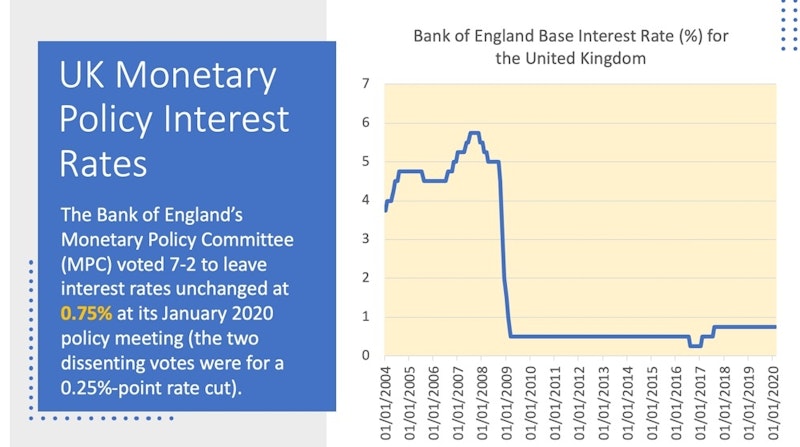Topic Videos
What next for UK interest rates in 2020?
- Level:
- AS, A-Level, BTEC National, IB
- Board:
- AQA, Edexcel, OCR, IB, Eduqas, WJEC
Last updated 27 Feb 2020
In this short video we look at five arguments for the Bank of England raising interest rates from their current very low level and five counter arguments making the case perhaps for a rate cut rather than an increase. We’ll also look at a range of updated macroeconomic indicators.

Justifications for raising UK interest rates
- Business and consumer optimism is increasing as Brexit uncertainty lifts. The economy can sustain a slightly higher level of interest rates
- Fiscal policy is being loosened by the new government – monetary policy can seek to control risks of excess aggregate demand by acting as a counter-balance
- The UK labour market continues to be strong (wages now rising at 3.2% pa) – interest rates should normally be higher at this stage of the cycle
- Rising interest rates justified to bring about an improvement in housing affordability for millions struggling to find properties to buy or rent
- Unless interest rates rise now – with the economy still growing – there will be less scope to cut them again in the next economic downturn
Justifications for cutting UK interest rates
- UK growth is slowing – real GDP grew by only 1.1% in the last year – a rise in interest rates would risk causing a broadly-based downturn. Inflation remains below target.
- Manufacturing industry is close to recession. Higher interest rates might cause the sterling exchange rate to appreciate leading to a deterioration in net trade and export jobs
- Household debt levels are high – millions of people are vulnerable small increases in the cost of credit / debt that might follow a base rate increase
- Although unemployment is low (3.8% of the labour force), real wages have only just recovered from their 2008 pre GFC level and there remains a high level of under-employment
- There are big uncertainties about the global impact of the coronavirus with growing fears of a global recession as trade stalls and labour movement is restricted
You might also like

Twin Peaks for the UK Economy
19th October 2014
Regulation of Payday Loans (Financial Economics)
Study Notes
Macro Revision - Topical Issues in the UK Economy
Teaching PowerPoints

Why Financial Markets Matter - Short Lesson Video
20th November 2015

Negative interest rates defy gravity
9th June 2016
Consumer Confidence & Economic Cycles
Topic Videos
What is Crowding In?
Study Notes
Daily Email Updates
Subscribe to our daily digest and get the day’s content delivered fresh to your inbox every morning at 7am.
Signup for emails